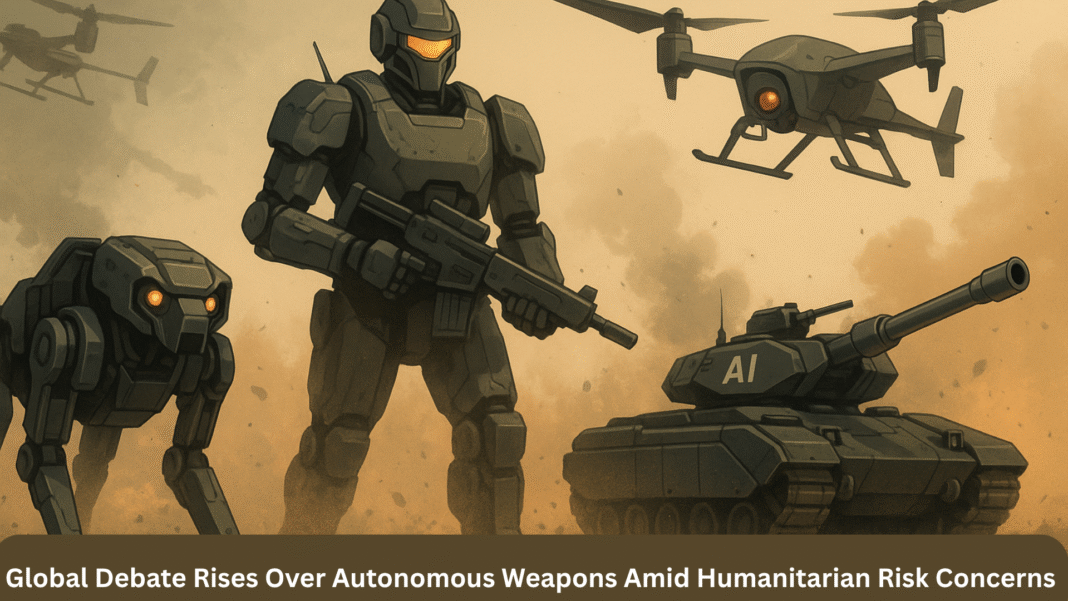In a rapidly evolving world where artificial intelligence is infiltrating every corner of life, the debate over lethal autonomous weapons systems-popularly dubbed “killer robots”-has grown louder than ever. With wars actively raging and AI capabilities expanding at breakneck speed, humanity faces an urgent question: should machines be allowed to make life-or-death decisions? This article explores that crisis at the heart of the United Nations’ efforts to regulate this technology before 2026.
Killer Robots: The Soldiers That Don’t Need Sleep
At the heart of the United Nations this week, the world was again forced to confront an escalating issue: Killer Robots, or more formally, Lethal Autonomous Weapons Systems, or LAWS. The so-called “killer robots” now under examination attract attention not just because of their futuristic features but because of the real danger they present to humanitarian and ethical imperatives in contemporary warfare. Despite simmering debates since 2014, the talks were taking place with active wars raging in Ukraine and Gaza, where autonomous systems are no longer a hypothetical.
UN Secretary General António Guterres made one of the strongest pleas yet, to stand by a 2026 deadline for a legally binding fix. “Machines with the power and discretion to take lives without human involvement are politically unacceptable, morally repugnant and should be prohibited by international law,” he said. What Guterres is saying is: Decision making when it comes to life or death should never be ceded to machines.
A Race Against Technology
The International Committee of the Red Cross (ICRC) -represented by President Mirjana Spoljaric also expressed such concerns. Spoljaric cautioned that technology is now advancing much faster than regulation so that the risks of LAWS are more imminent. What these systems would do, she observed, could change the character of war, global ethics, and humanitarian systems.
Not all drones are fully autonomous in the sense that they rely on artificial intelligence, but AI adds an enormous amount of capability. Even dumb systems which are pre-programmed can count as autonomous weapons if deployed without real-time human control, the UN says. The eerie novel layer of risk is the potential of AI to one day allow machines to decide who lives or dies due to an algorithm.
Geopolitics and Sovereignty
“There are necessary regulation functions here but it’s a tightrope that countries are walking,” says Rachel Bovard of the Conservative Partnership Institute. The United States in particular, she cautioned, should not vest too much national sovereignty in international law. “AI is the wild west,” she said, noting that current frameworks may be sufficient for now. Her restraint highlights a delicate balance between national security priorities and a drive for a single global treaty.
Yet momentum is building. In 2023, more than 160 countries endorsed a UN resolution calling for urgent action on the dangers of LAWS. Even so, there is no official international law that directly regulates their use. The session under the Convention on Certain Conventional Weapons (CCW) is the only global use of force forum dedicated to autonomous weapons, with talks taking place since 2014 with the objective of preventing them all together and curbing those which permit a degree of human intervention.
The Two-Tier Approach
A moving forward but also relatively little. In a two-day informal meeting in New York, a consensus seemed to emerge around a two-tier model:
- Total bans on some fully autonomous weapons
- Tough rules on humanmix others
This consensus is “a giant step forward, despite major sticking points,” said Nicole van Rooijen, executive director of the coalition Stop Killer Robots. The precise meanings of autonomy and “meaningful human control” remain elusive.
The Secretary-General pressed for urgent action: “We are running out of time to prevent it.”
Lessons from Ukraine
The sense of urgency isn’t only philosophical. Drone warfare, largely against civilians, has proved extensive in Ukraine’s Kherson region. U.N. investigators have corroborated over 150 civilian killings and hundreds of injuries from drone attacks, branding them crimes against humanity.
Ukraine, too, is dependent on drone systems, and the country has even led efforts to build what it calls a “drone wall” for national defense. Whereas advanced drones were once the preserve of wealthy countries, Ukraine’s use of cheaply adapted drones is reshuffling international military doctrine. As this model proliferates, the barrier to entry for autonomous weapons comes down – prompting concerns of a global rush.
The Moral Crisis
Izumi Nakamitsu, the top official in the UN Office for Disarmament Affairs, puts it bluntly: “Deploying machines with the power and the discretion to take human life is not only reprehensible but morally repugnant.” This fear of “digital dehumanization” is also expressed by Human Rights Watch, which has cautioned that AI algorithms are playing an ever-larger role in policing, law enforcement-and now warfare.
“Major powers including the United States, Russia, China, Israel, and South Korea, are investing huge resources to develop autonomous technologies for land, air and sea, posing serious threats to humanity,” says Human Rights Watch advocacy director Mary Wareham. Advocates of AI combat make an argument that machines provide an edge over people, among them precision, stamina and dispassionate judgment. But the tech is still far from polished.
“Machines frequently make mistakes in identifying targets,” Wareham said. “For example, people with disabilities may be misunderstood to be threats. These facial recognition and biometric systems are tainted by bias themselves, and they’re not very effective at all when it comes to identifying people with darker skin.”
Accountability in Question
But beyond technical malfunctions, LAWS generate a legal and ethical void. If a rampaging killer robot mows down a war crime, whodunit? The manufacturer? The programmer? The commanding officer? “Who do we need to hold accountable?” asks Nicole van Rooijen in a commentary on how difficult it is to pin blame on anyone in a world of autonomous warfare. “It would be a moral failure for these systems to be used en masse,” she said.
Toward a 2026 Treaty
The UN is working towards agreeing a legally binding treaty by 2026. The informal in May 2025 was a turning point at which the Secretary-General drew the line, not to mention on the calendar, and called on Member States to “now double their efforts”.
Nicole van Rooijen is still cautious, but she is feeling optimistic. While she agrees that “we’re nowhere near negotiating a text,” she commended the current chair of the CCW for tabling a “rolling text” that may in future be able to “serve as a framework” if there is sufficient political will.
Mary Wareham voiced that sentiment, noting that at least 120 countries have endorsed the pursuit of new international law. The support of peace laureates, tech workers, faith leaders and AI experts gives the movement moral weight.
Izumi Nakamitsu underscored the UN’s position: “What is clear is that there is a growing consensus around the idea of a ban on fully autonomous weapon systems. Someone has to be held accountable when it comes to war.”
A Crossroads for Humanity
With the age of AI sweeping through every industry – from banking to security to ethics – the killer robots debate becomes one of the defining global questions of our era. Will mankind permit machines to decide who shall live and who shall die, or draw a line which no one should pass?
The clock is ticking. And the world needs to make up its mind quickly.
Conclusion
The accelerating development of lethal autonomous weapons systems presents one of the most urgent moral, ethical, and legal dilemmas of our time. As wars in Ukraine and elsewhere demonstrate the reality of drone and AI-enabled warfare, the calls for regulation are intensifying. The world now stands at a pivotal moment-one where we must choose between embracing a future dictated by algorithmic warfare or enforcing rules that preserve our humanity. The UN’s 2026 deadline could be our last chance to get it right.
FAQs
What are Lethal Autonomous Weapons Systems (LAWS)?
LAWS are weapons systems that can select and engage targets without human intervention. They may or may not use AI, and are considered a major threat due to their potential for misuse and lack of accountability.
Is there any international law banning LAWS?
As of now, there is no international treaty that specifically bans or regulates LAWS. The UN aims to have a binding treaty in place by 2026.
Which countries are developing autonomous weapons?
Major nations including the United States, Russia, China, Israel, and South Korea are actively investing in autonomous weapons technologies.
Why is human control important in warfare?
Human control ensures accountability, ethical decision making, and reduced risk of accidental killings due to AI or algorithmic errors.
What is the UN’s position on killer robots?
The UN and Secretary-General António Guterres have repeatedly stated that machines should never have the discretion to take human lives and are pushing for a global ban on fully autonomous weapons.
Reference
UN revisits ‘killer robot’ regulations as concerns about AI-controlled weapons grow
‘Politically unacceptable, morally repugnant’: UN chief calls for global ban on ‘killer robots’
As AI evolves, pressure mounts to regulate ‘killer robots’
Stay updated with all the latest news and insights – News Of US






